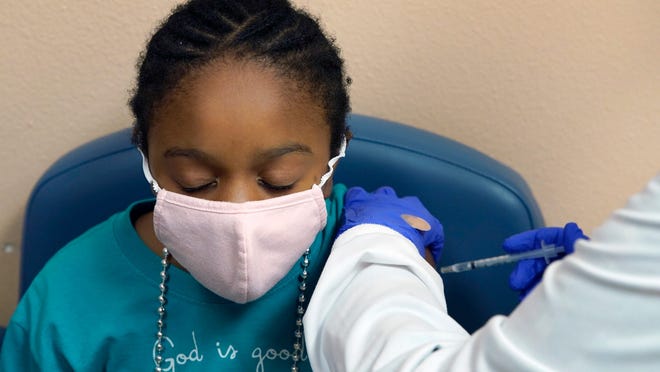- The CDC found 21 cases of MIS-C in people ages 12-20 who got at least one dose of the COVID-19 vaccine from Dec. 14, 2020, to Aug. 31, 2021, according to a new report.
- Experts say the study published Tuesday in The Lancet Child & Adolescent Health reinforces the risk-benefit ratio in favor of COVID-19 vaccination.
As federal regulators continue to investigate the COVID-19 vaccine in children under 5, a new report by the Centers for Disease Control and Prevention has identified cases of a potentially dangerous but quite rare hyper-inflammatory condition in vaccinated adolescents.
Researchers at the agency studied cases of multi-system inflammatory syndrome – an immune overreaction associated with COVID-19 infection – in vaccinated young people age 12 to 20 from Dec. 14, 2020, to Aug. 31, 2021.
They found 21 reports of MIS-C in those who received at least one dose of the COVID-19 vaccine, according to the study published Tuesday in The Lancet Child & Adolescent Health. Six showed no evidence of prior coronavirus infection, and everyone in the study received the Pfizer-BioNTech vaccine.
While the report may appear concerning at first, experts say a deeper dive into the data highlights the importance of vaccination in children and teens as most of the cases were in those not considered fully vaccinated. The study also shows unvaccinated young people are still more likely to develop MIS-C compared to those who are vaccinated.
“At first glance, it seems to cause us to step back and say, ‘Wait a minute, are these vaccines contributing to MIS-C?’” said Dr. Jim Versalovic, pathologist-in-chief and COVID-19 command center co-leader at Texas Children’s Hospital. “It does the opposite for me. It emphasizes the point of vaccination.”
CDC researchers determined developing MIS-C after vaccination is extremely rare, suggesting only one case occurs per million vaccinated people in this age group. It’s rarer still for a vaccinated person to develop MIS-C without laboratory evidence of prior COVID-19 infection, about .3 cases per million.
Previous estimates suggested MIS-C occurs in about 200 cases per million unvaccinated young people, the CDC said.
“Even if there is questionable risk (with COVID vaccination), it’s still a much lower risk than not getting the vaccine and getting the disease,” said Dr. Guliz Erdem, an infectious disease expert at Nationwide Children’s Hospital and a professor of pediatrics at The Ohio State University.

The report found 11 young people developed MIS-C after their first dose and 10 after their second. The median time from dose to hospitalization was eight days for those who received one vaccine dose and five days for those who received two.
Under CDC guidelines, people are considered fully vaccinated two weeks after receiving their second dose.
“That tells me that these children were infected before they were vaccinated and they just didn’t have sufficient time to develop immunity with the vaccine prior to developing MIS-C,” Versalovic said.
IS SOME PROTECTION BETTER THAN NONE? Delay in COVID-19 vaccines for kids upset parents. Experts say it was the right thing to do.
A TEEN ATE LEFTOVER RICE AND NOODLES: Hours later, doctors amputated his legs and fingers
Experts have a few hypothesis for the six cases of MIS-C found in young people without evidence of a prior COVID-19 infection. Antibody tests, for example, may not have been sensitive enough to detect an asymptomatic infection.
Study authors say it’s also possible something else may have triggered an overreactive immune response “coincidentally after vaccination,” causing MIS-C symptoms like fever, rash, eye redness, and gastrointestinal symptoms.
Regardless of the possible explanations, experts say the study reinforces the risk-benefit ratio in favor of COVID-19 vaccination. With only 57% of 12- to 17-year-olds fully vaccinated, according to CDC data, they urge parents get their children vaccinated to protect them against the worst outcomes of COVID-19, including MIS-C.
“It is clear that children who are only partially vaccinated are still susceptible to MIS-C,” Versalovic said. “We’ve got to get those children who are eligible now vaccinated as soon as possible.”
Follow Adrianna Rodriguez on Twitter: @AdriannaUSAT.
Health and patient safety coverage at USA TODAY is made possible in part by a grant from the Masimo Foundation for Ethics, Innovation and Competition in Healthcare. The Masimo Foundation does not provide editorial input.
